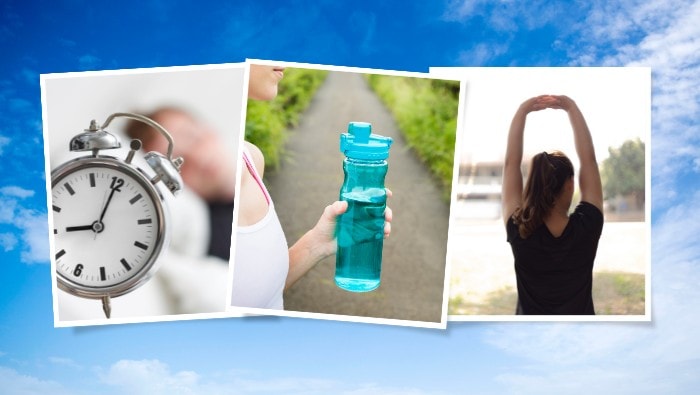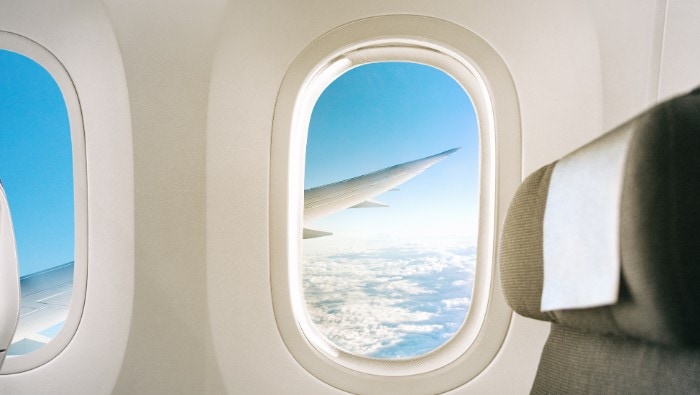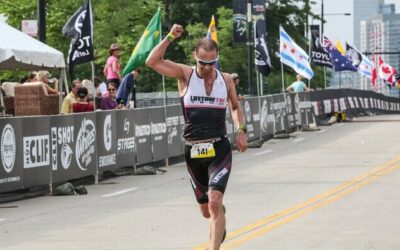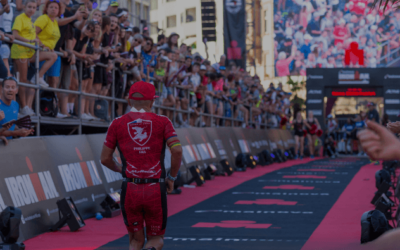As you prepare to embark on a thrilling travel journey for your upcoming Ironman Triathlon event, there’s one challenge that can sneak up on even the most seasoned athletes: jet lag and travel fatigue. These relentless enemies can significantly impact your Ironman performance, holding back your ability to achieve your goals and reach your full potential and jeopardizing the countless hours of training, dedication, and preparation you’ve invested.
Jet lag occurs when you travel across multiple time zones and disrupt your body’s natural circadian rhythm, which regulates your sleep and wake cycles. Travel fatigue, on the other hand, is caused by the physical and mental stress of traveling, including long flights, disrupted sleep, and changes in diet and hydration.
Our aim with this blog post is to provide you with strategies and tips that will help you minimize and manage jet lag and travel fatigue so that it won’t affect your race day performance. Let’s begin!
Causes and Symptoms of Jet Lag and Travel Fatigue
Jet lag and travel fatigue are caused by different factors, but both can have a significant impact on your physical and mental well-being. Understanding the causes and symptoms of each one can help you develop strategies to manage them effectively.

Causes of Jet Lag
Jet lag occurs when you rapidly cross multiple time zones, disrupting your body’s internal clock.
The primary factors contributing to jet lag include:
- Disrupted Circadian Rhythm: Your circadian rhythm regulates essential bodily functions such as sleep, wakefulness, and hormone production. Traveling across time zones disrupts this natural rhythm, leading to a mismatch between your body’s internal clock and the local time at your destination.
- Light Exposure: Sunlight and darkness play a vital role in regulating your circadian rhythm. When you travel to a different time zone, your exposure to light shifts, confusing your body’s internal clock and exacerbating jet lag symptoms.
Symptoms of Jet Lag
Recognizing the symptoms of jet lag can help you proactively manage its effects on your performance.
Common jet lag symptoms include:
- Fatigue and Lethargy: Feeling excessively tired and lacking energy is a hallmark of jet lag. Your body struggles to adjust to the new time zone, leaving you feeling drained and sluggish.
- Sleep Disturbances: Jet lag often disrupts your sleep patterns, leading to insomnia or excessive daytime sleepiness. This can impact your overall well-being and ability to perform at your best.
- Cognitive Impairment: Jet lag can impair your cognitive function, resulting in difficulties with concentration, memory, and decision-making. These cognitive challenges can impact your race strategy and overall performance.
Causes of Travel Fatigue
Travel fatigue happens when physical and mental exhaustion is experienced during long journeys.
Several factors contribute to travel fatigue, including:
- Prolonged Immobility: Sitting in cramped spaces, such as airplanes or cars, for extended periods can lead to muscle stiffness, reduced blood circulation, and overall physical discomfort.
- Dehydration: Airplane cabins have low humidity levels, contributing to dehydration during travel. Insufficient hydration can lead to fatigue, headaches, and decreased physical performance.
- Disrupted Sleep Patterns: The unfamiliar environment, noise, and discomfort of travel can disrupt your sleep, leaving you feeling unrested and fatigued upon arrival.
Symptoms of Travel Fatigue
Recognizing the symptoms of travel fatigue can help you implement effective strategies to combat its impact on your Ironman performance.
Common symptoms include:
- Muscle Soreness and Stiffness: Prolonged periods of immobility during travel can result in muscle soreness and stiffness, affecting your flexibility and overall physical readiness.
- Reduced Immune Function: Travel fatigue can compromise your immune system, making you more susceptible to illnesses and infections. Protecting your health is essential for maintaining peak performance.
- Mental Exhaustion: The physical strain of travel, combined with the stress of logistics and unfamiliar environments, can lead to mental exhaustion. This can impact your focus, motivation, and ability to perform optimally.
Pre-Travel Preparation to minimize jet lag and travel fatigue
Let’s start with some valuable pre-travel strategies and tips to minimize the effects of jet lag and travel fatigue. This will help ensure you arrive at your Ironman destination feeling energized, focused, and ready to conquer the race.

Here are some tips for pre-travel preparation:
Adjust your sleep schedule for a smooth transition
One of the keys to combating jet lag is ensuring that your body adjusts smoothly to the new time zone.
Follow these tips to optimize your sleep patterns before traveling:
- Whenever possible, try to arrive at your destination at least two to three days before your Ironman triathlon to allow your body time to adjust to the new time zone.
- Choose flights that arrive at your destination during the day to help your body acclimate to the new environment and avoid disrupting your sleep patterns.
- If you have a layover, choose a shorter one to reduce the total travel time and minimize the impact of jet lag.
- Start adjusting your sleep schedule a few days before your departure, gradually shifting it closer to the time zone of your destination. This will help ease the transition and minimize jet lag symptoms.
- If you’re traveling to a location that’s ahead of your current time zone, start adjusting your sleep schedule a few days before your trip by going to bed and waking up earlier.
- If you’re traveling to a location that’s behind your current time zone, start adjusting your sleep schedule by going to bed and waking up later.
Stay hydrated and eat healthy foods
Proper nutrition and hydration are vital for combating travel fatigue. Follow these tips for healthy and nourishing travel:
- Drinking plenty of water and eating healthy foods can help reduce the impact of travel fatigue.
- Avoid excessive amounts of caffeine and alcohol, as they can disrupt your sleep patterns and cause dehydration.
- Bring along portable, nutrient-dense snacks such as fresh fruits, nuts, protein bars, and dried fruits to fuel your body and avoid reliance on an unhealthy airport or roadside food options.
Exercise regularly
Preparing your body physically for the challenges of long-distance travel is essential. Consider these strategies to minimize the impact of travel fatigue:
- Stick to your training routine leading up to your departure. Consistency is key to preserving your physical fitness and reducing the risk of muscle stiffness and soreness during travel.
- Engage in regular stretching and mobility exercises to alleviate muscle tension and improve blood circulation. These practices will help keep your body limber and minimize discomfort during long journeys.
- Prioritise self-care activities such as foam rolling, massage, and hot/cold therapy to relax your muscles, enhance recovery, and reduce the physical strain of travel.
Consider natural remedies
Certain natural remedies, such as melatonin, may help regulate your sleep-wake cycles and reduce the impact of jet lag.
CAUTION: Always make sure to talk with your doctor before taking any new supplements or natural remedies.
What to do during travel
Now that you are prepared to travel, it is time we focus on what you can do during the trip in order to minimize jet lag and travel fatigue.

Here are some tips for managing jet lag and travel fatigue during your travel.
Stay hydrated
Dehydration can worsen the symptoms of jet lag and travel fatigue, so it’s important to drink plenty of water throughout your trip.
Avoid excessive amounts of caffeine and alcohol, as they can dehydrate you and disrupt your sleep patterns.
Sleeping on the plane
If possible, try to get some sleep on the plane to help your body adjust to the new time zone.
Bring a travel pillow, eye mask, and earplugs to help you get more comfortable and block out noise and light.
Exercise during layovers
If you have a layover, try to use the time to exercise and move around. Walking around the airport or doing some light stretching can help improve circulation and reduce muscle soreness and stiffness.
Post-Travel Recovery
Post-travel recovery is an important step in managing jet lag and travel fatigue. After you arrive at your destination, it’s important to take some time to rest and recover before your Ironman triathlon.

Here are some tips for post-travel recovery
Prioritise Post-Travel Recovery
After you arrive at your destination, try to take some time to rest and recover.
- Rest and Recharge: After a long flight, it’s crucial to give your body the time it needs to recover. Incorporate rest into your travel plan by scheduling a day or two of downtime upon arrival. Use this time to relax, adjust to the new environment, and allow your body to recuperate from the travel stress.
- Very Light Physical Activity: Engage in light physical activity such as walking or gentle stretching to promote blood circulation and reduce muscle stiffness. However, avoid intense workouts during the initial recovery period to prevent further fatigue.
- Stretching: Perform gentle stretching exercises to alleviate muscle tension and stiffness. Focus on major muscle groups such as the legs, hips, back, and shoulders. Stretching improves flexibility, reduces the risk of injury, and promotes overall mobility.
Get some sunlight
Exposure to sunlight can help regulate your sleep-wake cycles and reduce the impact of jet lag. Try to get outside and spend some time in natural sunlight, especially during the morning and midday hours.
If you feel drowsy during the day, take short power naps of around 20 minutes. However, avoid napping too close to bedtime to ensure a restful night’s sleep.
Stay hydrated and eat healthy foods
Drinking plenty of water and eating healthy foods can help reduce the impact of travel fatigue.
Avoid excessive amounts of caffeine and alcohol, as they can disrupt your sleep patterns and cause dehydration.
Additional Strategies
At this point, we gave you plenty of strategies to help with minimizing jet lag and travel fatigue before your Ironman race but there are some additional strategies that you may consider using. These strategies will involve supplements and alternative medicine or the use of sleep tracker apps.

Let’s talk about them in more detail.
Supplements for Jet Lag and Travel Fatigue Management
WARNING: Always consult with your doctor before taking new supplements or vitamins.
- Melatonin: Consider using melatonin supplements to regulate your sleep-wake cycle and adjust to new time zones more quickly. Take melatonin approximately 30 minutes before bedtime in your destination’s time zone. Start with a low dosage and consult with a healthcare professional for personalized advice.
- Vitamin B12: Incorporate vitamin B12 supplements to support energy metabolism and combat fatigue. Vitamin B12 can help enhance your overall energy levels during travel and assist with recovery upon arrival at your destination.
- Magnesium: Explore the benefits of magnesium supplementation for relaxation and improved sleep quality. Magnesium can help calm the nervous system, promote muscle relaxation, and aid in post-travel recovery.
Acupuncture Methods
Seek guidance from a qualified acupuncturist who specializes in treating jet lag and travel fatigue. They can create a customized treatment plan that addresses your specific needs and helps rebalance your body’s energy.
Sleep tracker apps
Sleep tracker apps use the sensors in your smartphone or wearable device to track your sleep patterns, providing insights into your sleep quality, duration, and cycles.
Some sleep tracker apps offer jet lag-specific features to assist in managing jet lag and travel fatigue. These features may include personalized adjustment plans to help you gradually adapt to new time zones and optimize your sleep schedule accordingly.
As you approach your Ironman Triathlon, remember that conquering jet lag and travel fatigue is within your reach. By implementing the strategies and tips shared in this blog post, you’ll be equipped to overcome these challenges and give your best performance on race day.
Wishing you a fantastic race and an exceptional trip filled with unforgettable experiences. Go out there and show the world what you’re capable of!





0 Comments